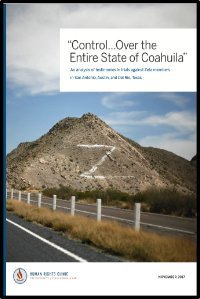By Human Rights Clinic at the University of Texas School of Law.
The Human Rights Clinic at the University of Texas School of Law, in cooperation with the Centro Diocesano para los Derechos Humanos Fray Juan de Larios from Coahuila, Mexico, has compiled a report based on analyzed witness testimonies from three U.S. federal trials. Between 2013 and 2016, Zeta members were put on trial in Austin, San Antonio, and Del Rio for crimes of homicide, conspiracy to import drugs and weapons, and money laundering. These trials brought new information to light and corroborated information that has already been documented about Zeta operations and human rights abuses. First-hand testimonies of ex-Zeta cartel members and victims provide a more comprehensive understanding of the dire situation in Coahuila and offer a glimpse into the Zeta structure, members, and nexus with state officials and institutions. After reviewing the witness testimonies, the Clinic has determined two major findings: (1) the Zeta cartel committed numerous human rights abuses in Coahuila with impunity; (2) public institutions and officials played a role, by actions or omissions, in the commission of these abuses. Testimonies describe the nature and degree of Zeta influence over state and municipal officials and institutions. The Zetas paid bribes and integrated police officers into their hierarchy to ensure the cartel would be able to continue their illicit operations without resistance. However, the Zetas did not only influence low level state or municipal police; witnesses described a level of Zeta control which extended to city police chiefs, state and federal prosecutors, state prisons, sectors of the federal police and the Mexican army, and state politicians. Multiple witnesses described bribery payments of millions of dollars to Humberto Moreira and Ruben Moreira, the former and current governors of Coahuila, in exchange for complete control of the state. According to the testimonies, the Zetas’ influence over Coahuila government operations at all levels allowed them to conduct their business throughout the state with impunity and often with direct assistance from state officials and police officers. The report also documents the human rights abuses discussed in the witness testimonies, including the large-scale disappearances and killings in March and April of 2011, during what is known as the Piedras Negras and Allende Massacres. These crimes were perpetrated in response to information that three former Zeta operatives had begun to cooperate with U.S. authorities. In retaliation, the Zetas kidnapped, killed, and disappeared over 300 people who they believed to be associated with the former Zeta operatives
Austin, TX: University of Texas, Human Rights Clinic, 2017. 56p





